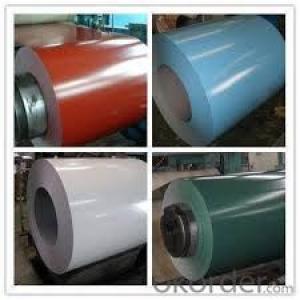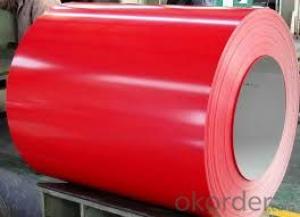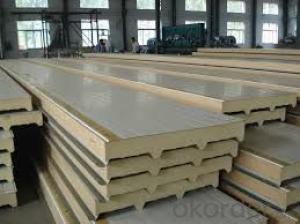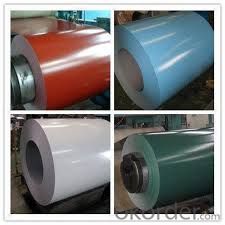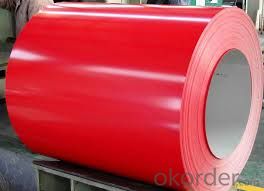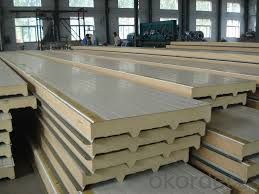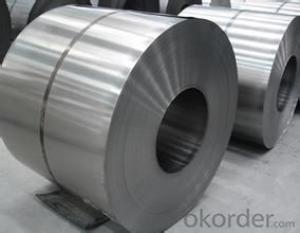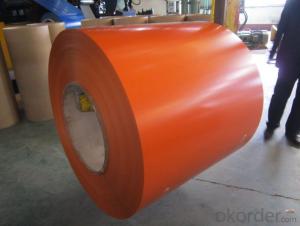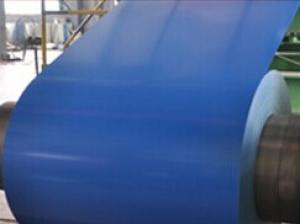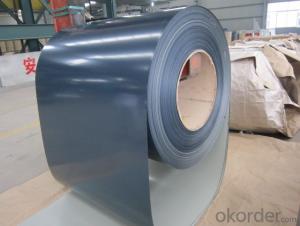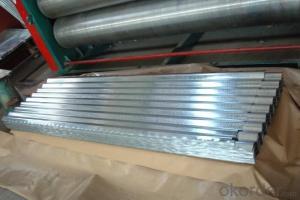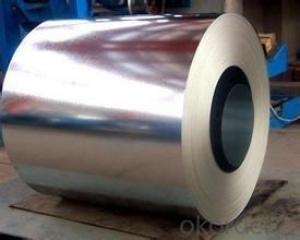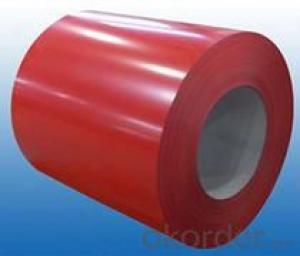Pre-painted Galvanized/Aluzinc Steel Coil
- Loading Port:
- Shanghai
- Payment Terms:
- TT OR LC
- Min Order Qty:
- 20 m.t.
- Supply Capability:
- 9000 m.t./month
OKorder Service Pledge
OKorder Financial Service
You Might Also Like
Product Description
Specifications;
1. Aluzinc coating mass: 30g-275g/sqm
2. Coil weight: 4-6 tons per coil
3. Edge treatment: Mill edge or cut edge.
4. Technical treatment: Bright annealed, flatting, cold harden.
5. Surface treatment: Annealed, bright finish, dull/bright finish, slit edge.
6. Spangle: Normal/small/big/zero spangle.
7. Delivery terms: FOB / C&R / CIF
8. Supply Ability: 30000MT/month
9. Application: The construction industry: The roof structure, keel, grill, Clapboard, ceilings, fire shutter doors, etc; The light industry, the Automobile, agriculture, animal husbandry, fishery, casing of household Electronic application, civilian smoke stack, etc.
10. Delivery time: Within 30 days after the receipt of L/C or Signed the contract or according to customer's requirement.
Special design available according to requirement; Anti-corrosion And high-temperature resistant with black painting; All the production process Are made under the ISO9001: 2000 strictly
Second Glance of Photo
Galvanzied steel coil( GI, CRC)
Color coated steel coil(PPGI)
Package: Sea worthy Export Packing Standard export and seaworthy packing. (waterproof paper and metal sheet protection with fluted rings at inner and outer edges, 4 eye bands and 4 circumferential bands fasten the coil)
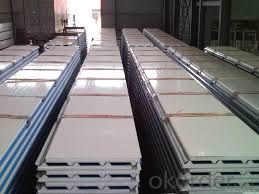
FAQ
1. Do you have QC team?
Yeah, sure, our QC team is very important, they will keep the quality control for our products.for quality inspection every day.
- Q: How are steel coils used in the manufacturing of electrical transformers?
- Steel coils are used in the manufacturing of electrical transformers as they provide a strong and durable core for the transformer. The coils are typically made of high-grade electrical steel, which has low electrical resistance and high magnetic permeability. These properties allow the coils to efficiently conduct and transform electrical energy, ensuring the proper functioning of the transformer.
- Q: so what is stronger tempered steel Blade or carbon steel Blade? a Machete made of those i said above what will last longer,what can cut better,which will will shatter first.
- 1. all steel blades are tempered, whether they are high carbon blades or low carbon blades. 2. It depends on what kind of steel they are made from. So im going to answer this question, using the following qualifications. 440A stainless steel 440C stainless steel - high carbon. The higher the carbon level, the more brittle a blade becomes. But the higher the carbon level, will increase a steel’s wear resistance , meaning it will have a better edge retention 2. They both will work well. Pros's / Con's The 440C blades will need less sharpening, but are harder to sharpen The 4401 blades will need to be sharpened more, but are far easier to resharpen. So it basically comes down to where you will be using them and how you will be using them. If your gonna be out in the middle of the jungle and stopping for the night, then the high carbon blade would probably be better, you use it all day, resharpen it at night. If your gonna be cutting brush, tobbaco, etc on your land, then the 440A would be better, because you can take a couple of min's to resharpen it often
- Q: in a lab at school we did heat treatment of steelwhat are the possible phases present in the steel sample in as-received, as-quenched and as-tempered conditions? specifically when is it ferrite, austenite and pearliteis the steel originally in the ferrite phase? then when headed turns into austenite and when quenched martensite is formed and when tempered cermentite is formed...........where is pearlite involved and am i correct about the ferrite?
- hey from what i learned in uni last sem, steel is originally ferrite form at first at room conditions. it will undergo poly morphic transformation to become FCC structure austenite form at 912 degree celcius. under conditions, it can become pearlite (which is a combination of ferrite and cementite) or bainitie( a finer form of pearlite). queching conditions to room temperature will form martensite which is the strongest but brittle steel form. tempered cementite is formed when we quench it and then raise temperatures before sir cooling. hope it helps, pls vote me best answer is i deserve it. thanks
- Q: What is steel made of? What are the elements other than iron?
- Steel is iron and carbon.
- Q: How are steel coils used in the manufacturing of metal furniture?
- Steel coils are used in the manufacturing of metal furniture as they provide the raw material for forming different components, such as frames, legs, and support structures. These coils are processed and shaped through various manufacturing techniques like cutting, bending, and welding to create the desired furniture pieces. The strength, durability, and versatility of steel make it an ideal material for metal furniture, ensuring stability and longevity in the final products.
- Q: I Don't have a Oxy act. torch but can Get a Propane one. The finished part(s) are .375 x .550 x .185
- An oxy would really be preferable, but a propane may do, I'm not sure you'll get an adequate temperature. They only way is to place the parts upon a clay brick or something simmilar, this will help the steel to hold it's heat, heat until cherry red. It must be vissibly red throughout the whole part at the same time and dumped immediately into cold water. If it's not completely cherry red, proper hardening will not occur and weak spots will be present. good luck
- Q: How are steel coils used in the manufacturing of suspension arms?
- Steel coils are used in the manufacturing of suspension arms as they provide the necessary strength and flexibility to absorb shocks and vibrations, ensuring a smooth ride. These coils, known as coil springs, are typically mounted between the suspension arm and the vehicle's chassis, supporting the weight of the vehicle and allowing for controlled movement and suspension travel. By compressing and expanding, steel coils help absorb the impact of bumps and uneven road surfaces, providing stability and improving overall handling and comfort.
- Q: I'm wondering if steel casings are bad for a 1911. I know that an AK-47 will eat up steel casings all day long, but steel casings are bad for, and can be hard on an AR-15. I only have brass for my AR and that will never change. I'm curious as to how a 1911 fairs with steel casings. Is it bad for the gun or does it not matter? I'm asking because steel cased rounds seem to be the only readily available ammo these days. Thanks
- steel casings go back to the early 1900's for 1911's. Most guns were always able to handle them and most of that has carried on. I would think glocks are a no no for steel for longevity but in the caribbean we have mainly steel casings and that's all we use. the 1911 is probably the most popular hand gun down there. I own one, and FM. Over 1000 rounds so far in her between me and my dad (previous owner)
- Q: Are Steel Building Kits really helpful while erecting a steel building?
- I put up a 30'x40' Mueller Steel Building from a bolt together kit 6 yrs ago. Fully insulated, 2 10'x10' roll up doors, 1 walk thru door, 3 windows, 2' overhang all around, and gutters. The building price minus the slab was about $9500. The only special equipment was a neighbor's large Farmall with a hay spike on the FEL that we used to lift the trusses in place. Then it was mainly cordless drills to put in LOTS of self tapping screws, circular saw with metal cutting blade, tall ladders, etc. Had help putting up the trusses and putting up the roof panels. Everything else I did by myself. Took about 6 wks, but that was only working weekends and maybe 3 evenings a week since that land is 30 miles from my house. Would have gone a lot faster with at least one helper.
- Q: Steels like YHB-2, MVS-8, and SK-5. Also if you know anything about these steels that would be helpful.
- White steel is a common shorthand name for white paper steel (shirogami hagane) which can be any of several fairly simple high carbon, water hardening steel grades. The carbon content varies by grade, and runs from 0.8 to 1.4%. The range of carbon content within a grade is a tight 0.1%. For example, the carbon content of Shirogami Hagani No1A is specified to be between 1.3 and 1.4%. Each grade also contains 0.1-0.2% silicon and 0.2-0.3% manganese, and only trace amounts of the impurities sulfur and phosphorus. Blue paper steel (aogami hagane) is also offered in several grades, with carbon content ranging similarly to the white grades. However, blue steel contains the additional alloying elements chromium and tungsten, and one grade (aogami super) also contains molybdenum and vanadium. The blue steels can be quenched in water or oil, whereas most of the white grades need a faster quench and require water.
Send your message to us
Pre-painted Galvanized/Aluzinc Steel Coil
- Loading Port:
- Shanghai
- Payment Terms:
- TT OR LC
- Min Order Qty:
- 20 m.t.
- Supply Capability:
- 9000 m.t./month
OKorder Service Pledge
OKorder Financial Service
Similar products
Hot products
Hot Searches
Related keywords
